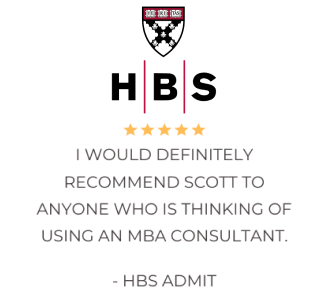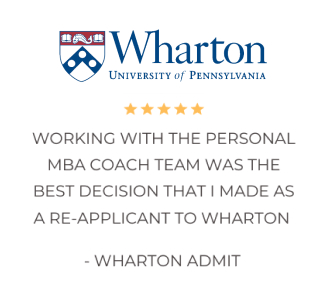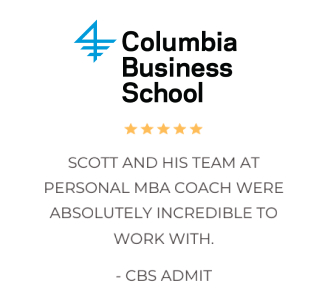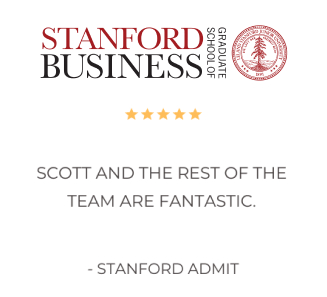Run by former Bain & Company and Deloitte consultants, Personal MBA Coach helps numerous consultants get into top MBA programs and earn significant scholarships each year. While consulting can be a great industry for starting your career and gaining strong pre-MBA experience and exposure, it is also a competitive field with many MBA applicants.
MBA admissions committees are looking to build well-rounded classes that include students from diverse backgrounds. Though most schools could easily fill an entire class with management consultants who have top GPAs, high test scores, and great experience, doing so would not make for very dynamic discussions. Thus, as a consultant, you have your work cut out for you to distinguish yourself from your peers in your MBA applications. Looking for help with your MBA applications? Check out Personal MBA Coach’s comprehensive packages to find out how we helped our clients earn $11M in scholarships last cycle!
Personal MBA Coach is here to help with expert advice for current or former consultants. But first, let’s look at the MBA school landscape and see where applicants with a consulting background fit.
Which MBA Programs Admit The Most Consultants?
The breakdown of students by pre-MBA industry across leading full-time MBA programs shows consulting as the #1 or #2 industry at many schools. However, there is a wide range in terms of the percentage of former consultants within the most recently reported MBA classes at leading schools.
Kellogg recently admitted the highest percent of consultants, with 32% of the class of 2026 coming from the industry, closely followed by MIT Sloan (30%) and London Business School (29%), as the table below shows. At Wharton, and Chicago Booth former consultants comprise over 20% of the class. However, if you are looking at Harvard Business School, Michigan Ross, UCLA Anderson or NYU Stern, you likely will face even stiffer competition, as consultants make up a smaller percentage of MBA students at these programs.

What Can You Do To Increase Your Chances Of Success For Admission?
Below are five tips that Personal MBA Coach recommends for its consultant applicants, based on our experience working with applicants from top consulting firms, including McKinsey & Company, Boston Consulting Group, Bain & Company, Deloitte, and many more.
1) Embrace your uniqueness
Do not write what you think admissions committee members want to read. There is no “ideal” candidate profile. Instead, your uniqueness will be one of your greatest selling points. This should include details on what you have done both in and OUT of the office. Regardless of your background, show the reader who you are and be sure to cover multiple aspects of your profile. While this does not mean you should provide a laundry list of details, discussing one or two unique skills, hobbies, extracurricular leadership roles, volunteer work, or language skills will paint a clearer picture for admissions committee members of who you are and what unique value you can add to their next class. To read more on how to articulate your personal story, check out this blog.
2) Show what you have done above and beyond the expectations for your role
Given that many consultants have worked on similar projects, it is crucial to focus on your unique professional accomplishments. Be honest with yourself. If three friends of yours also recommended cost synergies for a recent client, maybe you have something more unique (even if it is not the most impressive) to mention.
Think about projects in which you have gone the extra mile or added an innovative point of view. Let your admissions committee readers see how you have stood out as a leader and leveraged analytical and/or out-of-the-box thinking.
Have you taken on extra projects? Signed up to volunteer within the organization? Mentored a junior colleague? Any additional measures that show your strengths and initiative will help ensure that your MBA application stands out.

3) Develop a strong MBA resume
Your MBA resume provides a crucial opportunity to distinguish yourself as a candidate. You may be thinking, “No problem, I already have a resume.” You do, but it is not the one you need for a successful MBA application. An MBA resume shows multiple aspects of your profile, not just a chronology of your employment or job functions; it provides concrete evidence that you have been successful and demonstrated leadership.
Unlike potential employers, MBA admissions committee members do not need to know each detail of your job, especially if you are a former consultant. Instead, focus on and highlight your key accomplishments.
That said, you should include specific and measurable results such as “increased performance 30% over previous year” or “drove $1M in new business through x, y, z” to show personal growth over time as well as your impact on business performance.
In addition to their professional strengths, successful MBA applicants are active in their communities, athletics, neighborhood organizations, etc. Including these details on your resume shows readers other aspects of your candidacy. This is another way you can both embrace your uniqueness (per point 1) and set yourself apart from your peers. For more tips on writing MBA application resume, check out our blog “What is an MBA Resume?”
4) Select and prepare your recommenders carefully
Selecting the right people to write your MBA letters of recommendation will also help your application stand out. Be sure to choose someone who knows you well and who will take the time to write a great letter of recommendation. As a consultant, you want someone who can compare you to other applicants and show how you have distinguished yourself among your peers.
It is crucial that your recommenders be familiar with your work, your character, strengths, your weaknesses and your career aspirations. The best MBA letters of recommendation show an intimate familiarity with the candidate.
An ideal letter of recommendation will complement the rest of your application. You do not want your recommender to repeat exactly what your resume and other materials already say, but you also want to make sure there is no conflicting information.
Take the time to prepare your recommenders by sharing your career aspirations, reminding them of your key accomplishments, and telling them what you plan to discuss in your essays. If you have a skill set your future recommender has not seen yet, model the behavior now that you want them to write about later. For more insights, make sure to check out this quick tips video with Scott Edinburgh, Founder of Personal MBA Coach:
5) Broaden your school list
While Personal MBA Coach writes a lot about the M7 business schools, many other top schools are climbing in the MBA rankings. Furthermore, the MBA application process is something of a numbers game: For example, your profile might be great but if there are too many qualified consultants from your country or region in a given year’s pool, you may struggle to stand out.
This is why our average candidate applies to five or more schools. For some, this means applying to schools from a range of tiers. For others, this means spreading their application eggs across multiple top-tier-school baskets.
Of course, the target list for all candidates must match the candidate profile. Be sure that you have not only a wide enough list but also one that is reasonable based on your GPA, GMAT/GRE score, and specific consulting experience. Personal MBA Coach prides itself on offering open and honest feedback on your chances of success at any given school. We want our candidates to reach high but to be strategic and realistic as well. Do not miss our blog on school selection if you want to learn more.
How Can Personal MBA Coach Help You?
Hear from a past consultant how Personal MBA Coach can help:
Get started with a consultation to learn more about our comprehensive consulting services.




















